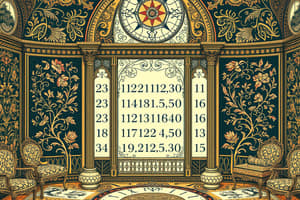Podcast
Questions and Answers
Find the HCF of 32 and 24.
Find the HCF of 32 and 24.
- 8 (correct)
- 6
- 5
- 7
What is the LCM of 3 and 5?
What is the LCM of 3 and 5?
- 10
- 30
- 15 (correct)
- 20
Reduce 12/20 to the lowest term.
Reduce 12/20 to the lowest term.
- 2/5
- 4/5
- 1/2
- 3/5 (correct)
What is the sum 1/2 and 1/6?
What is the sum 1/2 and 1/6?
The least among the following fractions is ________.
4/7, 1/2, 5/6 and 3/10
The least among the following fractions is ________. 4/7, 1/2, 5/6 and 3/10
How does the LCM relate to the GCD when simplifying fractions?
How does the LCM relate to the GCD when simplifying fractions?
What is the first step to find the LCM of multiple numbers?
What is the first step to find the LCM of multiple numbers?
Why is finding the LCM of multiple numbers more nuanced than finding the LCM of two numbers?
Why is finding the LCM of multiple numbers more nuanced than finding the LCM of two numbers?
What is the algorithmic approach suggested for finding the LCM of multiple numbers?
What is the algorithmic approach suggested for finding the LCM of multiple numbers?
In the example provided using 3, 5, and 7, what is the LCM for 3 and 5?
In the example provided using 3, 5, and 7, what is the LCM for 3 and 5?
What method is recommended for efficiently finding the LCM of multiple numbers according to the text?
What method is recommended for efficiently finding the LCM of multiple numbers according to the text?
What does taking the highest exponents in prime factorization help achieve when finding the LCM?
What does taking the highest exponents in prime factorization help achieve when finding the LCM?
Flashcards are hidden until you start studying
Study Notes
Finding the Least Common Multiple (LCM) of Multiple Numbers
The Least Common Multiple (LCM) is a fundamental concept in arithmetic and algebra that helps us determine the smallest positive number that is divisible by all given numbers without any remainder. While finding the LCM between two numbers is a common practice, especially in calculations like finding the greatest common denominator for fractions, the process becomes more nuanced when it comes to multiple numbers.
Finding LCM of More than Two Numbers: Algorithm and Example
To find the LCM of multiple numbers, you can follow this step-by-step approach:
- Find the LCM of the first two numbers.
- Find the LCM of the next number with the LCM found in step 1.
- Keep repeating step 2 with the new LCM until all numbers are included.
Let's explore this with an example using the numbers 3, 5, and 7:
- Find LCM(3, 5): 15
- Find LCM(15, 7): 105
Thus, the LCM of 3, 5, and 7 is 105.
Finding LCM with a Prime Factorization Approach
A more efficient method for finding the LCM of multiple numbers is by using their prime factorization. This method involves listing the unique prime factors of all numbers and taking the highest exponents for each factor.
For our example using 3, 5, and 7:
- 3 = 3^1
- 5 = 5^1
- 7 = 7^1
Now, find the maximum exponents for each unique factor:
- 3: 1 (since 3 is already raised to the highest possible exponent)
- 5: 1 (since 5 is already raised to the highest possible exponent)
- 7: 1 (since 7 is already raised to the highest possible exponent)
Next, multiply the numbers with their highest exponents:
LCM = 3^1 * 5^1 * 7^1 = 3 * 5 * 7 = 105
LCM and Applications
The Least Common Multiple has a wide range of applications, including:
- Determining the greatest common denominator for fractions: Write each fraction in its simplest form by dividing both numerator and denominator by their common factors. This common factor is the GCD, and the LCM of the denominators is the common denominator.
- Simplifying complex algebraic expressions: LCM helps simplify expressions involving products of fractions by reducing each term to a minimal form.
While the LCM concept may seem daunting at first, using the proper algorithms and methods can make the process more straightforward and efficient. The prime factorization approach, in particular, is a powerful tool that can be applied to find the LCM of multiple numbers quickly and accurately.
Studying That Suits You
Use AI to generate personalized quizzes and flashcards to suit your learning preferences.




